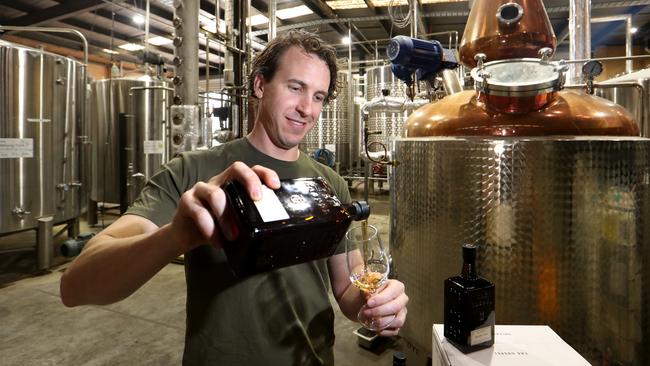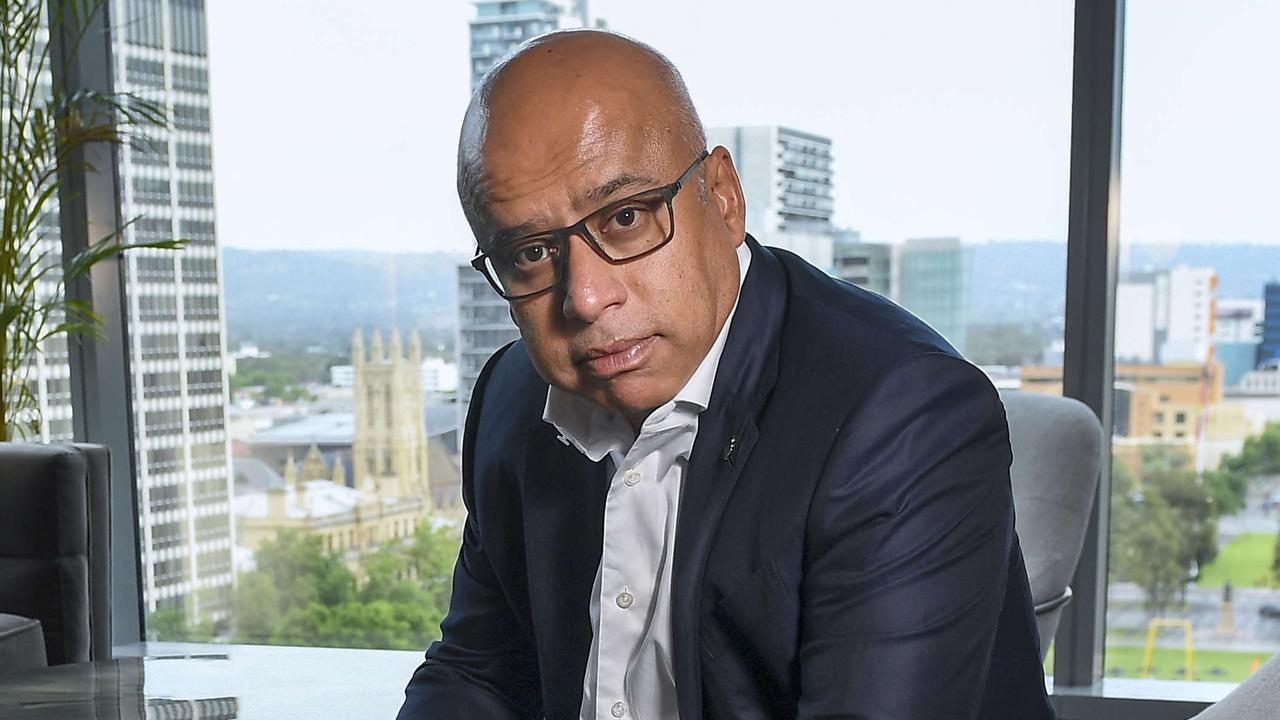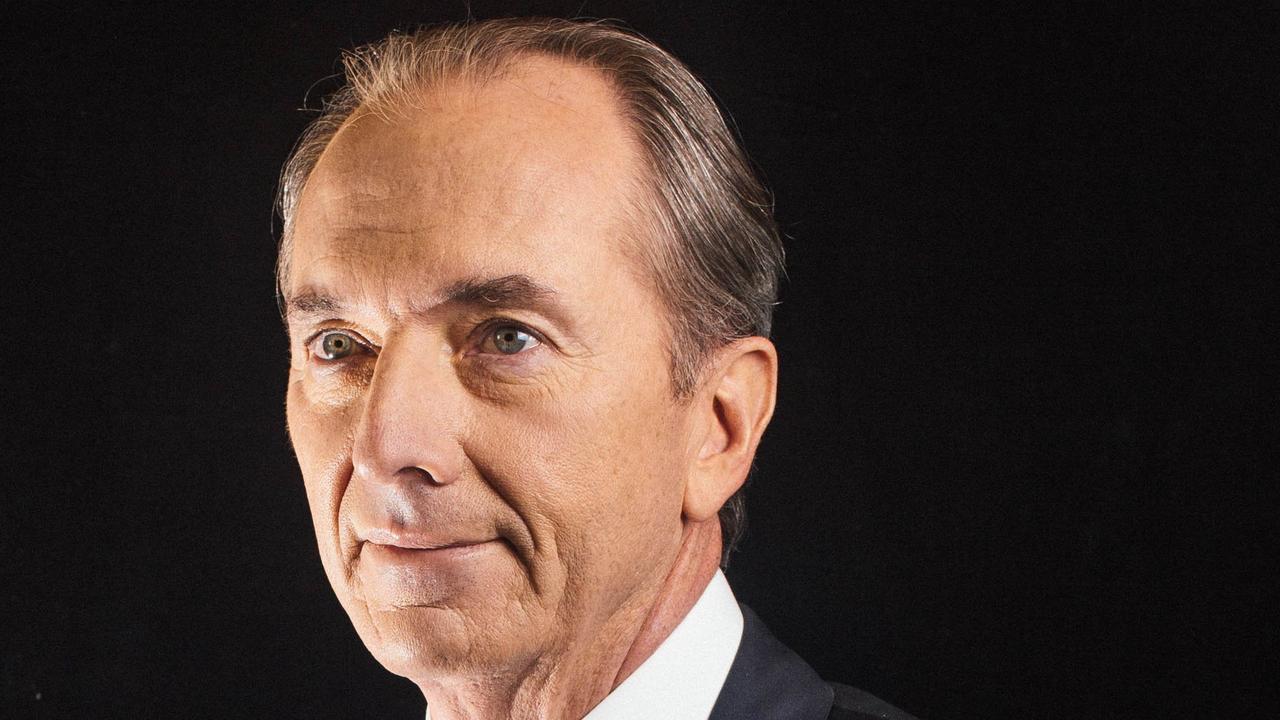Whiskey upstart targets US, Europe and overcomes adversity in a pandemic
Ben Bowles kept his spirits high by switching his distillery from producing solely whiskey to hand sanitiser.

Ben Bowles is starting 2021 brimming with optimism — his whiskey brand has hit its first year sales targets and he’s about to enter the European market thanks to Donald Trump. But six months ago it was a different story.
His business initially looked promising after launching his marquee brand, The Gospel - not that it has religious connotations (this is not a story about turning water into grog) - but because it remains true to distilling rye whiskey, the first style of whiskey produced by US settlers more than 300 years ago.
Bowles, who is originally from South Carolina, was on track to launch The Gospel in the US after receiving a leg-up through Vintage Cellars and an impending deal with Dan Murphy’s in the Australian market.
Then Covid-19 hit.
Sales plummeted and The Gospel’s distillery, which Bowles built himself with business partner Andrew Fitzgerald in an old fruit and vegetable warehouse opposite Buffalo Sports in Melbourne’s inner north, threatened to call last drinks.
But Bowles — a former engineer who pursued his childhood dream of distilling his own whiskey after “seeing the writing on the wall” at the tail end of the mining boom almost a decade ago — seized an opportunity that kept his business afloat.
What happened next highlights the resilience and entrepreneurial spirit of small Australian businesses — the engine of the national economy — and how to overcome adversity even when Covid-19 plunged the country into one of its sharpest recessions.
Bowles kept his spirits high by switching his distillery from producing solely whiskey to hand sanitiser.
“We did that for a few reasons. We did it to help continue cashflow, given we saw a massive drop-off in our own sales around that time. We also looked at a lot of people who were making hand sanitiser, and that was very early on, and they were charging quite high prices,” Mr Bowles tells the Weekend Australian.
“It was a way for us to keep our employees busy, generate cashflow. We sold it at a very competitive price, even less than it was going for at the supermarkets at the time. And mainly we were selling to medical outlets — doctors’ surgeries, GPs, dentists. It was a way of getting the hand sanitiser when they couldn’t get it from anyone else.”
The worst months were March and April and then from July the tide began to turn. Bowles was able to seal the deal with Dan Murphy’s as well as with a “few select” Woolworths BWS stores. It couldn’t have happened at a better time. As Melbourne was plunged into lockdown, and pubs were forced to close their doors, off-premises alcohol sales soared.
Thank you, Mr President
Now Bowles is re-plotting The Gospel’s international expansion — albeit with an unexpected detour, for which in part he has President Donald Trump to thank.
He was hoping to launch in the US, and expected Americans would find it “delicious” despite admitting “it’s funny because a lot of people are sceptical if you tell them you are going to send an American-style whiskey back to the States”.
But the Covid-19 pandemic has smashed those plans, with the virus killing an average of about 3000 Americans a day. Instead, Bowles now has his eyes on the European market.
The US and the EU have been in a long-running dispute over what each claim are unfair government subsidies to commercial-aircraft manufacturers: Airbus in Europe and Boeing in the US. The dispute has seen tariffs slapped on a range of products, with US whiskey caught up in the stoush.
On Thursday, the Trump administration said it would target more French and German wine and spirits with 25 per cent tariffs starting on January 12, in the latest escalation. And this is where Bowles can be thankful to the outgoing US President.
“We are actually really competitive, particularly for whiskey in the European market. When the US started putting all these tariffs on imports from the EU, the EU did the same thing for quite a few products coming from the US into Europe,” he said.
“So a lot of the US whiskeys have seen a bit of a bit of price hike. It really helps our products because we don’t have the same tariffs in the EU market and we have very similar products to the American whiskeys — we are very competitive in that market.
“We’ve picked up a European distributor that going to see us go into the UK as well as Germany and we are pretty close to getting picked up in France as well.”
He still plans to sell The Gospel in the US, but is writing off the next year.
“The way the States are looking will probably delay our entry into the States for another year-and-a-half to two years, so we are really refocusing our efforts primarily on the Australian market. I think there is going to be a bit of disruption for the next year for any new brands entering the US market.”
While spirits are fast becoming a crowded market in Australian, with new gins sprouting as fast as the botanicals they contain and whiskeys not far behind, Bowles and Fitzgerald have carved out a niche, producing Australia’s first American-style rye whiskey.
From resources to rye whiskey
The origins of the business began when the pair were having a drink after work about eight years ago, when they were both working in the mines as engineers and the resources boom was beginning to wane.
“As we were having our drink Andrew said, ‘I wish I knew how to make whiskey’,” Bowles said.
“I pulled out my phone and showed him a picture of my still back in the States and said ‘well, I know a little bit about it’.”
What Bowles, 38, knew about whisky was what he learned growing up in South Carolina from his grandfather. As a teenager he dreamed of producing his own drop, long before thinking about working as an engineer far away in outback Australian mines.
He and Fitzgerald initially created Melbourne Moonshine, described as “warm white lightnin’ with a true Southern kick”. That venture evolved into The Gospel — the first Australian-produced American-style rye whiskey — which hit the shelves at bottle shops in September 2019.
Bowles and Fitzgerald tipped $500,000-plus of their life savings into creating their own company and even used their engineering skills to design and build their continuous column still — the only one of its kind in Australia, designed and constructed in-house.
The pair has also secured their rye directly from farmer Corey Blacksell, who grows the grain in one of Australia’s hottest and driest regions — brewing giant Asahi has struck a similar deal with barley farmers in Victoria to supply its breweries in Abbotsford and Laverton.
“For me it’s as close as I get as a producer to the consumer, so it’s quite exciting to get involved as the supplier,” Blacksell says, whose farm is at Pinnaroo in South Australia’s Murray Mallee Region.
More important, the deal opens a lucrative market to Blacksell. Rye farmers have limited markets, with most of their grain going to the bulk millers. It is a niche industry, with growers producing about 30,000 tonnes a year. This compares with the 20-25 million annual output from wheat farmers.
The original
The Gospel uses about 10 per cent of the rye Blacksell produces each year. He says he didn’t charge Bowles a premium over the bulk supply market for a simple reason.
“When it’s 10 per cent of what you sell, it’s not about the big margins. It’s about just feeling valued within the value chain.
“Why should I sell it (rye grain) to a seed company who goes and sells it to farmer Joe, who is probably paying as much to the seed company as a margin as the seed company is paying me? I want to be cutting those people out.”
Bowles and Fitzgerald haven’t set themselves an easy task. Although rye is a hardy grain, capable of being grown in seemingly infertile soil, that hardness makes it notoriously difficult to work with.
But for Bowles it is about being true to his American heritage, and this is where his whiskey gets its name.
“It’s definitely not a religious connection. It’s because rye whiskey was the original whiskey of the United States.
“Rye was the only grain we could grow when the early settlers moved into the northeast of the US. But then it kind of died away. Everybody kind of switched to bourbon because bourbon is mainly corn and is much easier to produce and much easier to work with than rye.
“But being the original one, all your classic cocktails like Manhattan, Old Fashioned are meant to be made with rye whisky. So The Gospel is the truth. It’s the original.”
They can legally call it straight rye whiskey, given it’s made entirely from rye and uses new American oak charred barrels.
“From the very first day we started making it we had to know exactly how it is going to be processed because there are so many rules and regulations to be able to call it a straight rye whiskey. It’s very much like making Scotch whisky,” Bowles says.
“But we will have a point of difference in that we are an Australian distillery.”






